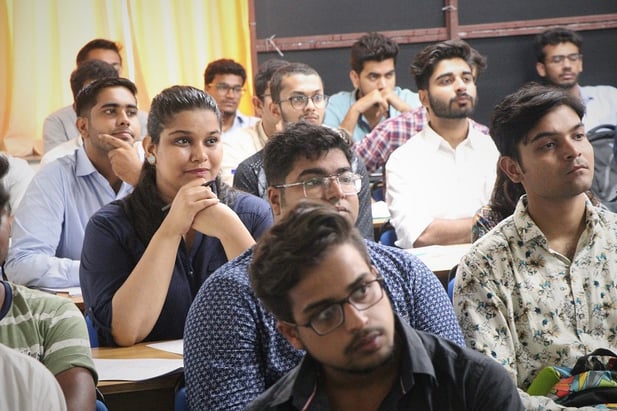We’ve all been taught to prepare for when life gives you lemons, but life gave us a pandemic! There is no precedent for this- at this magnitude or scale. To be a working professional or a graduating student in these rather odd times is an extremely tricky situation.
Me, well, I was a bit of both. When the pandemic hit India, I was a final semester student pursuing construction management course at RICS School of Built Environment, and I was one of the few ‘early-joiners’ from Campus Recruitment. I was placed as an Analyst at EY Strategy and Transactions for Transaction and Real Estate.
Somewhere between college, lectures, company onboarding and a typical three-hour-long daily commute, COVID-19 dictated emergency measure that would soon become the new normal. At college, we switched to online lectures. At work, we switched to a WFH approach. I jumped at the thought of having a month-long break from the on-coming Delhi summer and decided to head home to Mumbai.
It is no longer news that my month-long break, the month of March, or this pandemic is nowhere near over!

Working Through a Pandemic
I consider myself lucky though. I have not had a dull moment throughout this period. Experiencing home life, work-life and student life simultaneously will always be remembered. Nothing prepares you to drop off one MS Teams meeting to jump onto another until you have to do it.
The anthropology of our existence was evolving. It became essential to adapt to a comfortable yet distracting environment that often meant a spill over between all the different lives we live in. This means that we generally needed to learn to self-impose a work-life balance and manage studies. We needed to adapt to the absolute dependence on technology and the broad umbrella of IT and Analytics. The businesses that thrive in the long run, will be the ones that sustain the onset of technology that has been incorporated into their operation. In a sense, there is no going back.
A Career-based Education Helps
As I stepped into my role as an Analyst, I realised that I was armed with the technical knowledge and jargon for Real Estate management related works and valuations. I had a basic understanding of the work I was meant to be dealing in, but I needed to adopt my company’s style and the global awakening to the world of Analytics and Visualisation. It is important to have a versatile skill set. But it is more important to endeavour to develop such a skill set that plays to your strengths and industry demands. RICS SBE taught me to look at a problem from a holistic perspective. A professor once told me, ‘No development project can be all good or all bad. You need to be open to both sides and avoid prejudices while studying the problem’ I believe this is an extremely important lesson, especially when having conversations around conservation and sustainable practices in the Built Environment. The value of a property can range from the intended use of it to its potential and can even cover the revenue it generates. We learn to build a financial model and feasibility by considering all these factors.
Experiences, Understanding and Connecting
I had a wonderful MBA experience. I spent two years in an entirely new city. I had the opportunity to explore the various nuances that defined the city and simultaneously compared it to the real Estate hub I call home - Mumbai. I observed the lifestyle of the neighboring Hill stations like Shimla and Mashobra which are humble but unique real estate markets and could also appreciate the market and psyche of the various stakeholders in markets like Jaipur and Chandigarh. Once you understand the mindset of the sellers, buyers and developers; you understand the need and the demand that defines each market. This is what makes real estate management such a personalized and local subject.
Translating Learnings into Skills
We have always been encouraged to speak our mind at School. This has led to conversations about sustainable practices, heritage conservation, hospitality valuations, financial aspects in building a feasibility model and preserving the character of the region or market in question. At my workplace, better questions are encouraged. Therefore, I’ve learnt to carry a conversation forward and ask questions.
Successfully Steering Professional Growth
This pandemic taught the world to focus on what we need; in as much as businesses are shutting down because they cannot sustain themselves, new ventures are opening up to cater to our needs. For EY, this meant an effective push to our strategic and consulting vertical. I was lucky to be temporarily aligned on one such assignment that taught me a whole new skill set! I had to gain an understanding of region-specific Bankruptcy & Insolvency laws. I learnt to navigate a digital system that maintains cash management and a receipt and payment process.
My key learnings are that a ripple effect is inevitable between all industries and the Built Environment Industry will be affected either implicitly or directly; and that we can never stop learning or adapting ourselves.
Make your Mark- now is as good a time as any.
The industry is truly transcending all boundaries, and this is a good thing. Every unique skill will get utilized. The onus is on the professionals stepping into the field to be dynamic and even adventurous. We no longer need to fit into a mould to help our careers, we need to leverage our interests and talents to expand the opportunities coming our way.
About RICS SBE:
RICS School of Built Environment (RICS SBE), Amity University is an industry led academic institution which delivers specialized undergraduate and postgraduate programs to students ambitious to work in real estate, construction and infrastructure sector. It also aids as a hub for research and development of technical proficiency in built environment.